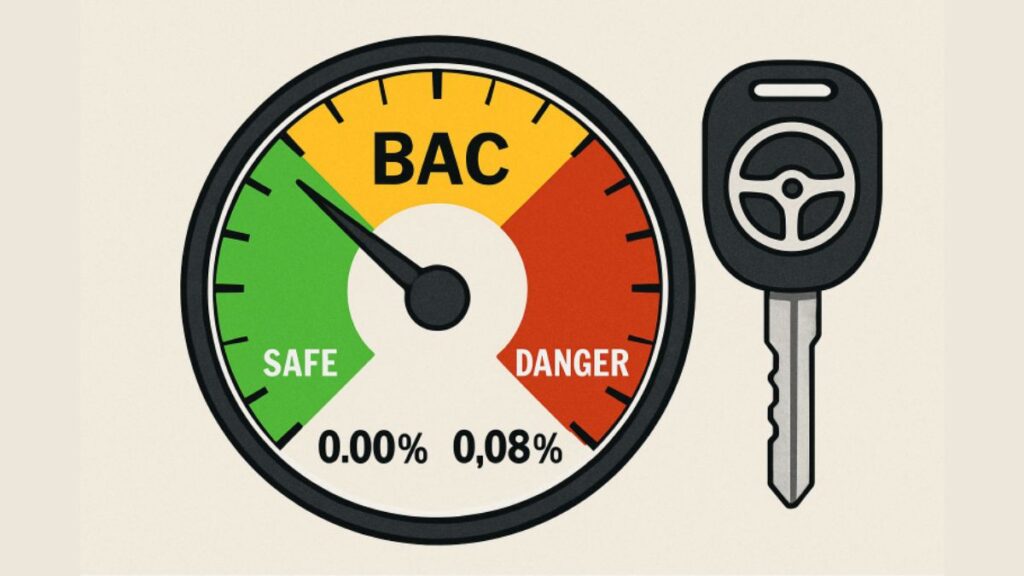Alcohol consumption affects the body in various ways, particularly when it comes to safe driving. Understanding where and why the law draws the line is vital for every driver. This awareness not only helps protect lives but can also prevent unforeseen legal trouble. Navigating the complexities of DUI charges can be difficult, which is why consulting experienced DUI lawyers is so important if you ever find yourself facing such charges.
Blood Alcohol Concentration (BAC) is the standard metric for determining how much alcohol is in a person’s system and their capability to operate a vehicle safely. Even at lower BAC levels, alcohol can impair vision, judgment, and motor skills—significantly raising the risk of accidents on the road.
Different BAC limits worldwide reflect local attitudes, research, and experiences regarding road safety and driver impairment. Increasingly, lawmakers are advocating for more demanding BAC standards to reduce injuries and fatalities linked to drunk driving.
Individuals charged with DUI often seek ways to strengthen their legal position by exploring advanced DUI defense strategies that address the unique circumstances of each case.
Understanding BAC and Its Effects
BAC, or Blood Alcohol Concentration, measures the proportion of alcohol present in one’s bloodstream, typically expressed as a percentage. For example, a BAC of 0.05% means there is 0.05 grams of alcohol per 100 milliliters of blood. Research demonstrates that even a BAC as low as 0.02% can cause slight impairment, such as reduced visual function and decreased ability to multitask. At higher BACs—0.05% and above—drivers may experience a lack of coordination, slower reaction times, impaired judgment, and diminished alertness, substantially increasing accident risk.
The relationship between alcohol consumption and its effects isn’t solely dependent on the amount ingested; factors like body weight, food intake, gender, and metabolism can also influence it. The best practice for safety remains not to drive at all after consuming alcohol.
Global Variations in Legal BAC Limits
Countries have adopted different BAC limits determined by roadway safety research and public-health priorities. Most states enforce a 0.08% BAC limit for standard drivers in the United States. By contrast, more than 100 countries worldwide have set their threshold at 0.05% or even lower in recognition of alcohol’s impact even in small quantities. Nations such as Sweden, Japan, and Brazil enforce a legal BAC as low as 0.02%. Many countries distinguish BAC limits further based on driver profiles, such as commercial drivers or young motorists, applying stricter rules to those groups to protect public safety. World Health Organization
The worldwide trend toward stricter BAC legislation reflects growing scientific consensus that lowering the legal limit effectively reduces crashes, injuries, and fatalities. These efforts are supported by international health organizations and local advocacy groups dedicated to road safety.
Impact of Lowering BAC Limits on Road Safety
Research over the past decade has consistently shown that implementing stricter legal BAC limits results in measurable improvements in road safety. Utah became the first U.S. state to lower its legal BAC for drivers from 0.08% to 0.05% in 2018. Following this change, traffic deaths in the state declined by approximately 20%, even while miles driven increased—a compelling indication of the regulation’s effectiveness. Multiple studies suggest that even small reductions in legal BAC limits correlate with fewer alcohol-involved crashes and discourage impaired individuals from making reckless decisions, such as choosing to drive.
These findings have sparked renewed discussion in other states and countries about how best to save lives on the road. Lowering BAC limits not only influences individual behavior but also raises public consciousness about the dangers associated with drinking and driving.
Recent Legislative Efforts in the United States
Several states are debating proposals to follow Utah’s lead and lower permissible BAC limits for all drivers. For example, lawmakers in Washington and Hawaii have recently introduced measures to adopt a 0.05% legal BAC threshold. Supporters of these initiatives argue that aligning U.S. standards with international best practices will reduce DUI-related injuries and deaths. However, some industry groups, such as restaurants and beverage associations, have voiced concerns about potential economic repercussions and fairness to social drinkers.
Despite ongoing debate, there is a clear trend toward adopting stricter regulations nationwide, motivated by the positive road-safety outcomes seen where similar policies have been enacted. Public health experts continue to emphasize the life-saving value of these legislative changes.
The Role of Technology in Detecting Impaired Driving
Advances in vehicle safety technology offer new tools to combat the dangers of drunk driving. Many modern vehicles feature built-in driver monitoring systems using cameras, sensors, and machine learning software to detect signs of impairment, such as swerving, erratic acceleration, or difficulty maintaining speed. If impairment is detected, the system can alert the driver or even safely bring the car to a stop, depending on the technology used.
In addition, interlock ignition devices—which require drivers to pass a breath alcohol test before starting their vehicles—are increasingly required for repeat DUI offenders in several states. As these and other technologies become more widespread, their potential to save lives and prevent accidents grows.
Responsible Drinking and Driving Practices
Ultimately, the safest policy is to avoid driving entirely after consuming alcohol. Designate a sober driver, arrange for a taxi or rideshare, or use public transportation if you plan to drink. Familiarize yourself with local legal BAC limits so you’re aware of the consequences and never assume you’re safe to drive because you “feel fine.”
- Assign a sober driver in advance for group outings.
- Take advantage of ride-sharing applications or local cab services.
- Understand how individual tolerance and eating before drinking can affect BAC.
- Keep current on laws in your area and any changes to BAC regulations.
If you or someone you know is facing DUI charges, seeking advice from qualified legal professionals and learning about practical defense tactics can be invaluable for a positive outcome. By making informed choices, we can each play a role in keeping roads safer for everyone.






